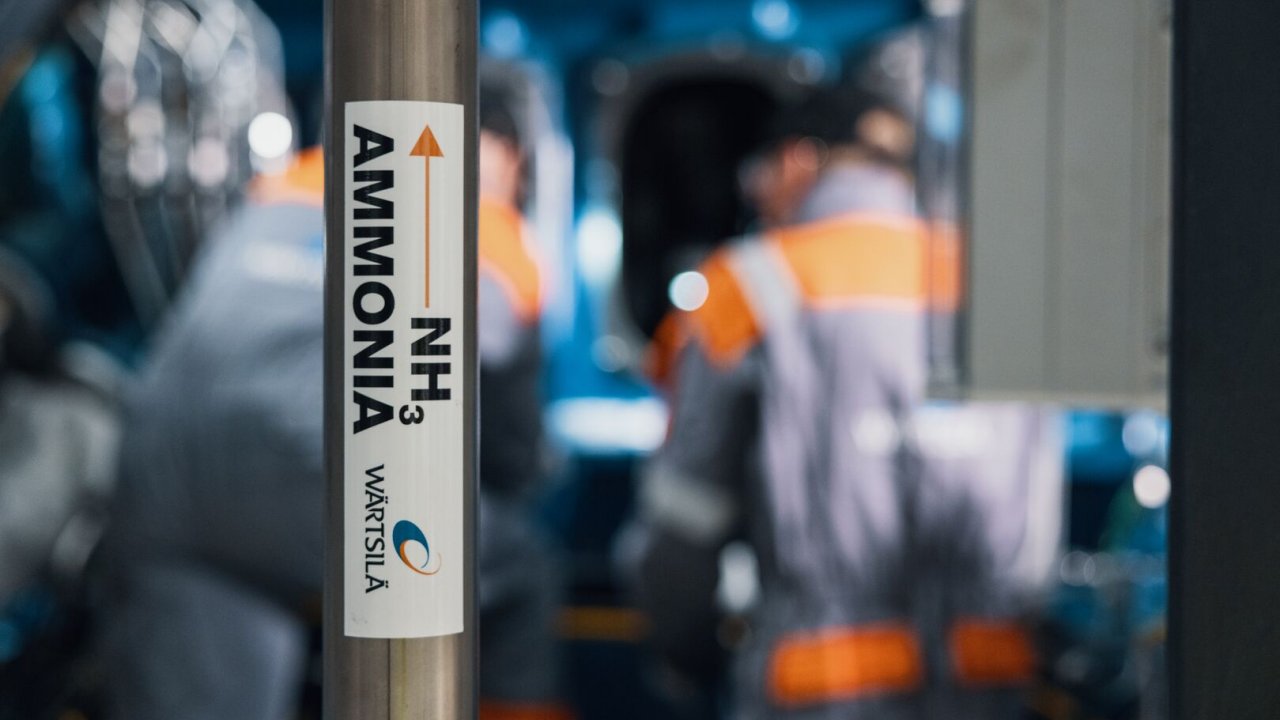
 |
Wärtsilä Gas Solutions has introduced its Ammonia Fuel Supply System (AFSS) for ships able to operate with ammonia fuel. The system is available for both liquid and gaseous fuel.
The Wärtsilä AFSS enables the use of ammonia as a marine fuel and is suitable for both newbuilds and as a retrofit for existing vessels.
It can be installed as an integrated cargo handling and fuel supply system on ships carrying liquefied gas, especially those able to trade ammonia as cargo, such as very large gas carriers (VLGCs) and midsize gas carriers (MGCs).
The AFSS can also be installed as a self-standing fuel supply system on non-gas carriers (IGF-coded vessels) with either low- or high-pressure systems, or a combination of both. The system can be configured with dedicated fuel storage tanks optimized for the trade of the vessel.
The ammonia fuel tanks are loaded through dedicated bunkering lines, or in the case of an ammonia or LPG carrier, reloaded from the cargo tanks. From the fuel tank, the ammonia is conditioned and prepared as fuel. A system consisting of pumps and heat exchangers is used to supply the engine with a stable and reliable fuel flow, at the correct pressure and temperature.
The AFSSs are said to be equipped with proven components, including the necessary purge gas treatment system. Due to the need for high cleanness of the fuel, proper filtering is installed upstream and embedded in the system.
"We have more than 50 years’ experience in handling ammonia onboard ships," said Stein Thoresen, Head of Sales Marine, Wärtsilä Gas Solutions. "This experience, along with our deep understanding and development of high efficiency cargo handling systems in general, has led to the introduction of this system, which we see as a key enabler for decarbonised operations," he added.
The first Wärtsilä Ammonia Fuel Supply Systems will be installed on two new gas carriers being built at the Hyundai Mipo Dockyards (HMD) in Korea for Exmar LPG. These midsize gas carrier newbuilds are set to be the first ever oceangoing vessels to be propelled by dual-fuel engines capable of operating with ammonia.

|
Maersk and Hapag-Lloyd suspend Strait of Hormuz transits amid Middle East security crisis
Container carriers reroute services around the Cape of Good Hope as military conflict escalates. |
|
|
|
||

|
Operations continue as normal at most Middle East ports
Most facilities operating normally, with exceptions in Oman and Saudi Arabia. |
|
|
|
||

|
Naftomar takes delivery of 93,000-cbm dual-fuel ammonia carrier
Gaz Ronin features a MAN dual-fuel engine with high-pressure selective catalytic reduction technology. |
|
|
|
||

|
AYK Energy completes world’s largest marine battery retrofit on Wasaline ferry
Aurora Botnia receives 10.4 MWh battery system, bringing total capacity to 12.6 MWh. |
|
|
|
||

|
Dalian Shipbuilding begins construction on LNG dual-fuel crude tanker
Development is one of a number of milestones reported by parent company over the past few days. |
|
|
|
||

|
Sallaum Lines launches Blue Corridor sustainability initiative for Europe–Africa ro-ro trade
Company deploys LNG-capable vessels with AI routing and eco-speed protocols on new green shipping corridor. |
|
|
|
||

|
Eidesvik Offshore signs yard contract for ammonia retrofit of PSV Viking Energy
Halsnøy Dokk to convert platform supply vessel as part of EU-backed Apollo project. |
|
|
|
||

|
North Sea Port completes risk analysis for alternative fuel bunkering operations
Port authority says LNG, hydrogen, methanol and ammonia can be safely refuelled across its facilities. |
|
|
|
||

|
Ammonia emerges as most feasible alternative fuel for deep-sea shipping in 2050 emissions study
Research combining expert survey and technical analysis ranks ammonia ahead of hydrogen and methanol. |
|
|
|
||

|
EMSA study examines biodiesel blend spill response as shipping adopts alternative fuels
Research addresses knowledge gaps on biodiesel-conventional fuel blends as marine pollutants and response measures. |
|
|
|
||
| Four cornerstones for a regulatory environment for sustainable fuels [News & Insights] |
| Bunker Holding and NeoGreen Hydrogen sign MoU for green ammonia and synthetic fuels [News & Insights] |
| Ammonia bunker vessel to be developed in Singapore [News & Insights] |
| Wärtsilä, Simon Møkster to test ammonia and LNG dual-fuel operation [News & Insights] |